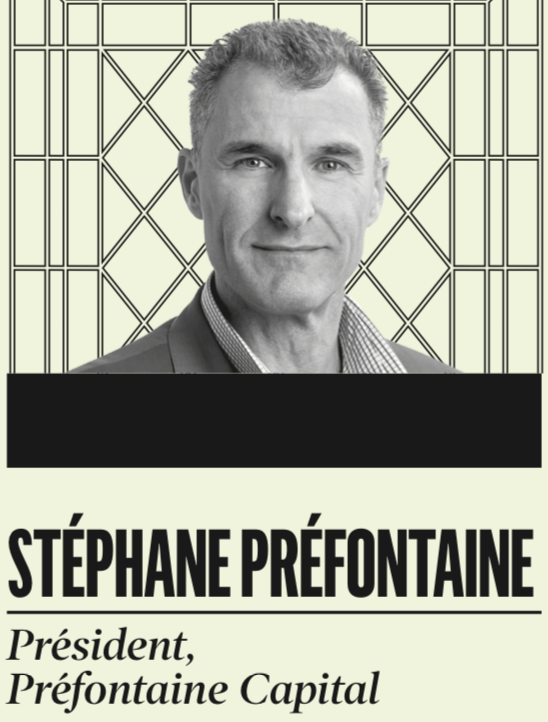Publications
FINANCIAL LETTER - FIRST QUARTER OF 2025
Amid economic turmoil and policy uncertainties, the first quarter of 2025 has been shaped by global trade tensions and the aftershocks of U.S. tariffs. The markets, reeling from a steep correction, now present cautious opportunities for patient investors. As geopolitical challenges persist, discerning strategies and a long-term outlook remain essential to navigating this evolving landscape.
April 30th, 2025
Learn moreFINANCIAL LETTER - FOURTH QUARTER OF 2024
In a year marked by robust stock market performance driven by the promise of AI advancements and favorable economic policies, 2024 saw impressive gains for the “Magnificent Seven” tech giants. However, the winds shifted with rising inflation and escalating interest rates, leading to a market correction. As we navigate 2025, looming trade tensions and geopolitical uncertainties pose new challenges, but also potential opportunities for discerning investors.
January 16th, 2025
Learn moreFINANCIAL LETTER - THIRD QUARTER OF 2024
Through this third quarter, the US economy as shown resilience with a strong employment landscape, though the manufacturing sector faces challenges amid political uncertainty. Meanwhile, Canada sees inflation near its target. Despite remarkable stock market gains that have persisted throughout the quarter, caution is warranted due to potential unforeseen crises and high overvaluations.
October 23rd, 2024
Learn moreFINANCIAL LETTER - SECOND QUARTER OF 2024
While the economic environment of Q2 2024 seems to be in a fairly normal range, it is the government indebtedness that’s in an excessive zone. On the stock market, the “Magnificent Seven” continue to run its course, distorting S&P 500 performance. As such, this trend towards concentration in a few stocks has been recurring for a long time, but has historically always eventually deflated.
August 7th, 2024
Learn moreFINANCIAL LETTER - FIRST QUARTER OF 2024
As stock market levels rise, investors’ guards are increasingly relaxed. No one knows what will happen in the short to medium term, but in an environment of high prices, it pays to be more cautious than usual.
April 24th, 2024
Learn moreFINANCIAL LETTER - FOURTH QUARTER OF 2023
The stock market year 2023 was marked by expectations of falling interest rates and the rise of artificial intelligence. The returns of Préfontaine Capital’s equity model portfolio from 1 to 10 years are presented.
January 25th, 2024
Learn moreFINANCIAL LETTER - FOURTH QUARTER OF 2022
2022 was marked by a surge in inflation, the rapid rise in interest rates followed by a corresponding fall in stock and bond markets, the war in Ukraine and some normalization of the pandemic (except in China). The World Bank estimates that the global economy grew by 2.9% in 2022.
Febuary 2nd, 2023
Learn moreFINANCIAL LETTER - THIRD QUARTER OF 2022
In its World Economic Outlook published on October 11th 2022, the International Monetary Fund (IMF) maintains its global growth forecast at 3.2% for 2022 but further lowered its forecast for 2023 to 2.7%, from the 2.9% it expected in July. The IMF sees very low growth for the US (1.0%) and the euro zone (0.5%) in 2023. Canada is expected to grow by 1.5%.
Febuary 2nd, 2023
Learn moreFINANCIAL LETTER - SECOND QUARTER OF 2022
The highlights of the second quarter were the sharp increase in interest rates by the US Federal Reserve and the Bank of Canada in the face of inflation of about 8-9% and its dampening effect on asset prices. The S&P 500 has fallen 20% since the beginning of the year through June 30.
August 12, 2022
Learn moreFINANCIAL LETTER - FIRST QUARTER OF 2022
The highlights of the first quarter were the war in Ukraine, the recognition by central banks of the importance of inflation and the emergence of the Omicron BA.2 variant. The International Monetary Fund lowered its projection of global growth in 2022 to 3.6% from the 4.9% expected last October.
August 12, 2022
Learn moreFINANCIAL LETTER - FOURTH QUARTER OF 2021
In its January report, the World Bank forecasts a slowdown in global growth in 2022 to 4.1% (from an estimated 5.5% in 2021) due to Covid, the reduction in fiscal and monetary support and persistent problems in supply chains. Depending on the trajectory of the pandemic, the Bank estimates that growth could range from 0.2% to 0.7% around its baseline projection. The forecast for 2023 is 3.2%.
August 12, 2022
Learn moreFINANCIAL LETTER - THIRD QUARTER OF 2021
In its October report, the International Monetary Fund (IMF) slightly reduced its forecast for global growth for 2021 to 5.9% from the 6.0% it expected in July, and for 2022 kept it at 4.9%. The IMF mentions the headwinds of resurgence of new strains of COVID-19 and limited access to vaccines in most countries around the world.
August 12, 2022
Learn moreFINANCIAL LETTER - SECOND QUARTER OF 2021
The World Bank, in its June report, forecasts the world economy will grow 5.6% in 2021, with uncertainties about the progression of the pandemic, vaccination rates and the high level of government debts, especially in emerging countries.
August 12, 2022
Learn moreFINANCIAL LETTER - FIRST QUARTER OF 2021
The global economy is in an uneven recovery mode, strong in some countries (USA, China in particular) and weak elsewhere, depending on the level of infection in Covid, the rate of vaccination and the level of government intervention in the economy.
May 06, 2021
Learn moreFINANCIAL LETTER - FOURTH QUARTER OF 2020
Review and lessons from 2020 In its January 2021 report, the World Bank estimates that the world economy shrank by -4.3% in 2020 and according to its baseline forecast, will grow by 4.0% in 2021 and 3.8% in 2022. For the United States, the figures are -3.6% in 2020, 3.5% in 2021 and 3.3% in 2022.
January 30, 2021
Learn moreFINANCIAL LETTER - THIRD QUARTER OF 2020
The International Monetary Fund (IMF) forecasts a contraction of the world economy of -4.4% in 2020, better than initially expected (-5.2%) and growth of +5.2% in 2021, slightly worse than initially expected (+5.4%). In Canada, the estimates are -7.1% in 2020 and +5.2% in 2021. In the United States, they are -4.3% and +3.1%. According to the IMF, the 2020-2025 period will only partially catch up to the world production that was forecast before the pandemic.
October 27, 2020
Learn moreFINANCIAL LETTER - SECOND QUARTER 2020
At the time of writing, in mid-July 2020, the Coronavirus outbreak seems to be resurfacing – in particular in the United States, India, Brazil, South Africa, but also locally in various other countries – following the deconfinement implemented by governments.
July 20, 2020
Learn moreFinancial Letter - First Quarter 2020
« This too shall pass » – Ancient Persian adage, quoted by Abraham Lincoln in 1859 The Coronavirus that struck in the first quarter is a reminder that any number of risks can strike at any time. Think of natural catastrophes, nuclear terrorist attacks, wars, etc. We cannot predict them, but as investors we must always keep these possibilities in mind and ensure that the allocation between our equity, fixed income and other private investments, including real estate, form a well-balanced portfolio suited to our age, risk profile and needs.
April 20, 2020
Learn more
Investors: Pay Attention to Financial Reporting Practices
Two important criteria in my investment decisions are the quality of the management team and the sustainability of competitive advantages. In my opinion, these are the two factors that will have the greatest impact on long-term success. This is important because we are looking for companies that we can keep in our portfolio for a very long time.
Translation from an article published on December 7, 2019
Learn moreSmall Independent Investors should use their Competitive Edge
The economic and financial environment is constantly changing. That’s why it’s important to continually challenge conventional wisdom and ideas that have worked in the past and think about how these changes affect us as investors. In recent years there has been a significant structural change in financial markets, which I believe has created momentum for large caps, was unfavorable for small caps and which could increase volatility:
Translation from an article published on September 28, 2019 in Les Affaires newspaper
Learn more
Qualities of Outstanding Investors
Students in finance often ask me what qualities are required to become a very good investor. This is a central question not only for young people looking to decide on their career, but also for institutional and private investors looking to select a portfolio manager. Here are my observations on the qualities leading to success.
Translated and adapted from an article published on July 18, 2019
Learn more
The Art of Investing: Creating Low Cost Hedges
I often hear people say, “Oh, I do not want to take any risk” I then ask them to define “risk”. In general, people answer: “I do not want to lose money.” I then ask them if a fluctuation in value of their listed stocks means for them “losing money” during the downward sequence. The answer varies, but I would say that generally a drop that lasts more than three years will test the patience of the average investor; if this results in a sale of stocks at a loss, this would then clearly cause a permanent loss of capital. I then go on to discuss an often-overlooked risk, that of a major loss of purchasing power in retirement. The discussion then revolves around how to balance three different types of risks: loss of purchasing power in retirement, permanent loss of capital, and fear/impatience with volatility.
Translation from an article published on May 9, 2019 in Les Affaires newspaper
Learn moreStock Market Volatility: Keep your Eyes on the Ball!
When I encounter friends on the street, I am sometimes told: “Ah, Stéphane, the stock market has come back!”; or “Ah Stéphane, how volatile is the stock market these days!”; or “Ah, Trump this” or “Ah, the Federal Reserve that”. I invariably answer: “Yes, it’s been more than four hundred years since stock exchanges exist and it’s been more than 400 years they go up and down; it does not concern me, since I invest in companies “.
Loosely translated from the original French version of an article published in Les Affaires March 09, 2019
Learn more
Creating Winning Conditions in the Stock Market with an Investment Professional
People often wonder why most institutional investors don’t beat their benchmark. Of course, there is high management fees, often from 2% to 3% annually for stock mutual funds, or lofty performance fees for hedge funds; these make it difficult to beat an appropriate index over a significant period, notably a full market cycle (say 10 years). But there is more.
Loosely translated from the original French version of an article published in Les Affaires December 08, 2018
Learn moreMy Take on Joel Tillinghast’s Recent Book
Professional money management requires to regularly take a step back from ongoing short-term news flow and external pressures. Delving into an in-depth topic helps to put things in perspective.
November 24, 2018
Learn more
A BETTER UNDERSTANDING OF VOLATILITY
“The stock market is a device for transferring money from the impatient to the patient.” – Warren Buffett Every investor should establish an investment policy statement that notably establishes the allocation between stocks and fixed income. This policy, which helps us stay the course, is mainly determined by our investment horizon, our financial goals, our specific needs (liquidity and others), and our risk tolerance.
Loosely translated from the original French version of an article published in Les Affaires October 06, 2018
Learn more"Invest at the Point of Maximum Pessimism". Some thoughts on Sir John Templeton's Famous Maxim"
Sir John Templeton is considered one of the great investors of the 20th century. He studied economics at Yale and law at Oxford. He began investing in 1937 and retired in 1992 at the age of 80, to devote his time to philanthropy by making donations totalling USD $1B. His Templeton Growth Fund returned 16% annualized from 1954 to 1992.
Loosely translated from the orignal French version of an article published in Les Affaires August 25, 2018
Learn more
Des titres pour la prochaine décennie
Les Affaires – À l’occasion de la messe annuelle de Warren Buffet, à Omaha, quatre gestionnaires ont accepté de suggérer des entreprises nord-américaines qu’ils apprécient et qui, à leurs yeux, offrent d’excellentes chances de performer à long terme. Voici les huit élues.
May 05, 2018
Learn moreEn attendant Buffett: comment trouver des sociétés gagnantes
Les Affaires – L’assemblée annuelle de Berkshire Hathaway se tient samedi. Nous publierons en fin de semaine un dossier dans lequel quatre gestionnaires nous suggèrent des titres pour la prochaine décennie. En attendant, un entretien avec l’un d’entre eux, Stéphane Préfontaine, qui révèle les sociétés susceptibles d’offrir une performance exceptionnelle.
May 04, 2018
Learn more
Du relais de la flamme olympique à la gestion de portefeuille
La Presse – À la veille du 40e anniversaire des Jeux olympiques de Montréal, La Presse présente un entretien avec un gestionnaire de portefeuille. Mais pas n’importe lequel: celui qui a porté la flamme lors des cérémonies d’ouverture en 1976.
July 16, 2016
Learn moreBOMBARDIER : IL EST TEMPS DE SERRER LES RANGS ET DE FONCER
La Presse – Il y a eu beaucoup de critiques concernant l’investissement du gouvernement québécois dans la société en commandite de la C Series
November 03, 2015
Learn moreDes titres de l'école Warren Buffett
Les affaires – C’est l’homme à imiter. Warren Buffett a inspiré des générations d’investisseurs qui veulent s’enrichir en achetant de solides sociétés prospères à long terme. Alors que se tient ce week-end la grand-messe des actionnaires de Berkshire Hathaway, voici les choix de quatre gestionnaires de portefeuille qui tentent de suivre les traces de l’oracle d’Omaha. (Stéphane Préfontaine)
May 02, 2015
Learn more
Avoir la patience d'attendre son prix
La Presse – Chaque dimanche, un financier répond à nos questions. Il donne sa lecture des marchés, offre son point de vue sur la Bourse et lance quelques conseils d’investissement. Cette semaine, Stéphane Préfontaine, de la firme Préfontaine Capital à Montréal.
November 23, 2014
Learn moreBombardier sous la loupe
La Presse – Le PDG de Bombardier, Pierre Beaudoin répondra aux questions des analystes jeudi matin pour discuter des résultats financiers, de la CSeries et de la mise à jour des prévisions par la direction. Beaucoup d’investisseurs sont récemment devenus plus prudents au sujet de Bombardier. Voici leurs commentaires.
February 10, 2014
Learn moreSYSCO
Les affaires – « Le fournisseur alimentaire Sysco est bien placée pour consolider son secteur » – Stéphane Préfontaine, président Préfontaine Capital
November 02, 2013
Learn moreLa sélection: se donner une plus grande marge de sécurité
La Presse – Parce qu’il y a de plus de plus de risques de dérapage, il faut s’assurer lorsqu’on achète des titres boursiers d’obtenir une plus grande marge de sécurité. C’est du moins une des préoccupations actuelles de Stéphane Préfontaine, président de Préfontaine Capital, lorsque vient le temps de déterminer les titres qu’il achètera ou conservera dans son portefeuille.
May 29, 2013
Learn moreLa sélection: les actions à conserver longtemps
La Presse – Stéphane Préfontaine, président de Préfontaine Capital, choisit des titres dans l’optique de les garder longtemps en portefeuille, de 5 à 7 ans en moyenne. Adepte du style de gestion valeur, M. Préfontaine choisit des titres de qualité qui se vendent actuellement en deçà de leur valeur intrinsèque pour des raisons qu’il juge temporaires. Il est persuadé que les quatre titres dont il parle aujourd’hui seront gagnants avant longtemps. Toutefois, il met les lecteurs en garde. Il est possible que ça ne soit pas le cas à court terme, dans six mois ou dans un an.
May 30, 2012
Learn moreDéfi boursier, admettre la défaite
La Presse – Je veux aussi remercier les trois gestionnaires de portefeuille qui ont accepté de quitter leur zone de confort pour participer à ce duel boursier. Les gestionnaires devaient tenir compte de plusieurs contraintes (horizon d’un an, TSX 60, ajustements trimestriels seulement, etc.).
February 11, 2012
Learn moreUne dernière chance de se repositionner avant le verdict
La Presse – Les trois gestionnaires qui m’accompagnent dans ce défi ne peuvent plus effectuer de changements d’ici la fin de cet exercice qui se terminera en février.
November 26, 2011
Learn moreBourse: le portrait a changé
La Presse – Le portrait économique et boursier a changé et la réflexion des gestionnaires aussi.
September 24, 2011
Learn moreDuel de la Bourse: suivre le plan de match
La Presse – Notre chroniqueur Michel Girard et l’animateur du Blogue de la Bourse, Richard Dufour, ont accepté de se mesurer dans une confrontation amicale. Après un trimestre, l’exercice montre que les prédictions boursières ne sont jamais aisées ! Quelques ajustements mineurs sont apportés, mais dans l’ensemble, le plan de match reste intact, même si la Bourse de Toronto s’est fait secouer depuis le défi. Résultats Trimestre 1
June 07, 2011
Learn morePrivilégier les valeurs sûres
La Presse – Les patrons m’ont donné carte blanche pour former une équipe qui va faire voir de toutes les couleurs au collègue Michel Girard. Mais le véritable objectif de cet exercice est d’abord d’aider les lecteurs de la Presse Affaires à voir plus clair dans le marché boursier actuel et mieux comprendre la réflexion qu’un gestionnaire professionnel effectue. Les choix des experts
February 12, 2011
Learn moreJe ne crois pas au «market-timing»
La Presse – Chaque samedi, un financier différent répond à nos questions. Il donne sa lecture des marchés, offre son point de vue sur la Bourse et lance quelques conseils d’investissement. Cette semaine, Stéphane Préfontaine, de Préfontaine Capital.
August 01, 2009
Learn more